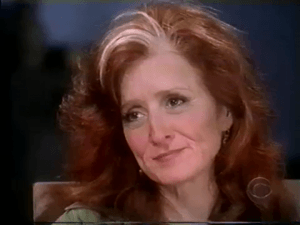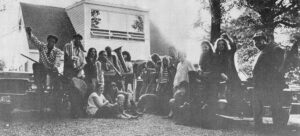
The scene looked like something out of a 1960’s coffeehouse. Bonnie Raitt was standing onstage in a smoky room for an audience of not more than 150 people, playing guitar and singing folk songs with an American flag and campaign posters hanging behind her. The year, however, was 1998, and Ms. Raitt was performing at one of the many benefits she takes part in each year. This one was for Senator Barbara Boxer, Democrat of California, and Ms. Raitt meant it.
”We may be kidding around up here,” she said, ”but there’s nothing funny about what might happen if she doesn’t get in.” (Senator Boxer, who took office in 1992, is up for re-election.) When Ms. Boxer stood onstage and spoke of the bills she supported that had been voted down, Ms. Raitt’s eyes seemed to cloud over with tears.
Ms. Raitt, who is to perform at the Beacon Theater in Manhattan on Friday, Saturday and Sunday, is a reservoir of empathy, overflowing with compassion for everything from the biggest environmental issue to the smallest personal detail. ”Do you do all your own transcribing?” she asked sympathetically as this interview began over lunch the day after the benefit. ”God, that’s a lot of work. I’ll try not to say so much.” Though the conversation was intended to focus on her new album, ”Fundamental” (Capitol), she couldn’t seem to keep it there, talking instead about Tom Waits, AC/DC (yes, she’s a fan of the heavy metal band), the musical closed-mindedness of commercial radio, her participation in this summer’s Lilith Fair and the plight of older musicians and executives who are struggling to keep their jobs in a business that thrives on youth. ”I thought that after I won those Grammys, people like Delbert McClinton and John Hiatt would then start having hit records because the kind of music we do straddles different genres,” she said of her four-Grammy coup in 1990. ”I thought maybe it would mean that age-ism wasn’t going to happen, but everything’s too bucks-driven.”

”Fundamental” is an atypical album for Ms. Raitt. Leaving behind Don Was, the producer who helped her put together her Grammy-winning No. 1 album, ”Nick of Time,” after two decades of critical acclaim but only moderate success, she decided to work with Mitchell Froom and Tchad Blake. Known for their work with Los Lobos, Richard Thompson and Elvis Costello, the two helped Ms. Raitt record 11 stylistically diverse songs that value raw musical immediacy over pop polish. Throughout the album, Ms. Raitt, who is married to the actor Michael O’Keefe, sings of the search for love and the struggle to keep love alive.
In Ms. Raitt’s music, everything is a collaboration, whether in a literal sense with musicians like John Lee Hooker, Sippie Wallace and John Prine or in a more metaphorical sense with the blues, folk, country and rock musicians who influenced her. Ms. Raitt’s empathy enables her to take songs written by veteran performers, singer-songwriter contemporaries and younger musicians and perform them not only as if she had written them but as if she lived them as well.
On ”Fundamental,” she takes a John Hiatt song and with help from Mr. Froom on keyboards, makes the emotions so fragile that one could snap them on one’s knee. ”Who will stalk that little bit of love that hasn’t been killed?” she asks in the song. The answer: ”Lovers will.”
”One of the reasons I wanted to work with Mitchell was that I wanted to be in a new situation with different people,” Ms. Raitt said. ”And he only wanted to work with me if I was willing to be in a situation where I might react differently. His first thought was: ‘Are you sure you know who you’re working with? Do you think your fans are going to appreciate that your record’s gonna sound like this?’ I told him that the fans that really appreciate me will be glad that I did something new. It’s not like I’m going in a David Foster direction: I’m going in a rootsier direction. The secretarial pool that likes the more middle-of-the-road songs may not get it, but they can always go back and listen to ‘Nick of Time.’ ”
When a 5-year-old boy scampered past the table, Ms. Raitt cooed, ”Awww,” as if she were a sweet grandmother, before she could stop herself. But Ms. Raitt, who is 48, will probably never be a grandmother.
”Having children is an incredible commitment,” she said. ”That’s why I chose not to. I feel that my job is to mother the causes that I’m involved in. And with me it’s already so hard to say no. No matter if I say yes to 5 organizations and benefits there are still 30 that I have to say no to. And that’s what I go to bed with at night, thinking, ‘What’s going to happen to that woman who said her Native American art department was going to close if I don’t do this show?’ ”
If the charities are Ms. Raitt’s children, then she certainly has a lot of them, from groups trying to curb air and water pollution to classes teaching guitar to young women to her organization that helps older rhythm-and-blues musicians cover their living expenses and receive recognition. At lunch, she was particularly upset because a bill establishing a nuclear waste site inon Texas had just been passed in the Senate and she had been helping a group that has been trying to halt it.
”You just do what you can,” she said. ”As long as I’ve got a mouth, somebody’s going to be hearing about it. I’m just glad I won those Grammys, so now I get on a better page when the newspapers cover these things.”
Ms. Raitt is not quite sure where her convictions come from. ”I think some people have a bent to act when they see something wrong,” she said. ”I have to say the driving force behind everything is an almost rabid need to be equal. I don’t know whether it’s because I came up in a feminist time or I just couldn’t stand watching white people step on black people in the South. I can’t stand bullies, you know. Some psychologist could probably unravel that.”
”But the same thing that drives you crazy is what makes you want to be able to help,” she continued. ”If you see a kid go over and kick a dog, it’s really hard not to want to go over and kick the kid. ‘How do you think that feels, buddy?’ I have to fight that rage. For a long time, I just thought I was a peaceful Quaker, a passive person, and I’ve come to terms with a lot of anger and rage. I think everybody has to come to terms with that. When I was partying I think I got a lot of it out that way. Now I just turn my amp up.”
Elaborating on her tumultuous years in the early 1980’s when she was dropped by her record label, Warner Brothers and drinking heavily, she said: ”I’m really grateful that I didn’t either kill myself or somebody else. I really used to think I needed to be messed up to sing the kind of music I sing.
”When I was in my 20’s, I hated the way I sang, so if I drank Jim Beam, I thought it would pickle my voice somehow. I don’t regret all those years, but I was one of the lucky people that could say no to it and not miss it that much.”
In preparation for the recording and touring in support of ”Fundamental,” she took time off to ”turn the volume down,” as she says, and indulge in some alternatives to partying. ”I miss being able to get out of my head more,” she said. ”So I have to learn to do that in other ways: either meditation or yoga or extreme athletics. One of the excruciating parts about being awake and sober is that you really have to come to terms with all of that darn stuff and anger and figure out a way to put a saddle on it. Otherwise you’re going to have a heart attack.”






 Visitors Today : 26
Visitors Today : 26 Now Online : 0
Now Online : 0















































































































